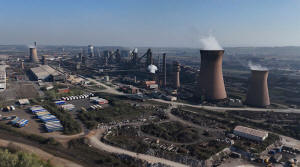UK will set 'high trust bar' for future Chinese investment after British
Steel rescue, minister says
[April 14, 2025] By
PAN PYLAS
LONDON (AP) — Chinese companies will have to clear a “high trust bar”
when investing in key sectors in the U.K., the country's business
secretary said Sunday, a day after he took effective control of
Britain’s last remaining factory that makes steel from scratch from its
Chinese owners.
Jonathan Reynolds said Jingye Group, which has owned British Steel since
2020, had not been negotiating “in good faith” with the government in
recent months over the future of the heavily loss-making steel works in
Scunthorpe in the north of England.
Reynolds said it had become clear on Thursday that Jingye would not
accept any financial offer from the government and that it was the
company's intention to close the blast furnaces “come what may,” while
keeping the more profitable steel mill operations and supplying them
from China.
In an interview with Sky News on Sunday, he declined to accuse the
company of deliberately sabotaging the business at the behest of the
Chinese Communist Party, but did accept that there is now a “high trust
bar” to bringing Chinese investment into the U.K.
“I personally wouldn't bring a Chinese company into our steel sector,”
he said. “I think steel is a very sensitive area.”
Prime Minister Keir Starmer summoned lawmakers back to Parliament on
Saturday to back a bill primarily aimed at blocking Jingye from closing
the two blast furnaces. The bill, which is now law, gives Reynolds the
power to direct British Steel's board and workforce, ensure its 3,000
workers get paid and order the raw materials necessary to keep the blast
furnaces running.

[to top of second column] |

This screen grab from PA video shows a view of the British Steel
plant in Scunthorpe, Lincolnshire, Saturday April 12, 2025. (Jamie
Lashmar/PA via AP)
 The British government had been
under pressure to act after Jingye’s recent decision to cancel
orders for the iron pellets used in the blast furnaces. Without them
and other raw materials, such as coking coal, the furnaces would
likely have to shut for good, potentially within days, as they are
extremely difficult and expensive to restart once cooled.
That would mean the U.K., which in the late 19th century was the
world’s steelmaking powerhouse, would be the only country in the
Group of Seven industrial nations without the capacity to make its
own steel from scratch rather than from recycled material, which use
greener electric arc furnaces rather than blast furnaces.
The repercussions would be huge for industries like construction,
defense and rail and make the country dependent on foreign sources
for so-called virgin steel, a vulnerability that lawmakers from all
political parties balked at.
In a separate interview with the BBC, Reynolds declined to give a
full guarantee that British Steel will be able to secure enough raw
materials in time to keep the blast furnaces going.
He said he would not “make my situation or the nation’s situation
more difficult” by commenting on specific commercial details.
“If we hadn’t acted, the blast furnaces were gone, steel production
in the U.K., primary steel producing, would have gone," he said. "So
we’ve given ourselves the opportunity, we are in control of the
site, my officials are on site right now to give us a chance to do
that.”
All contents © copyright 2025 Associated Press. All rights reserved |